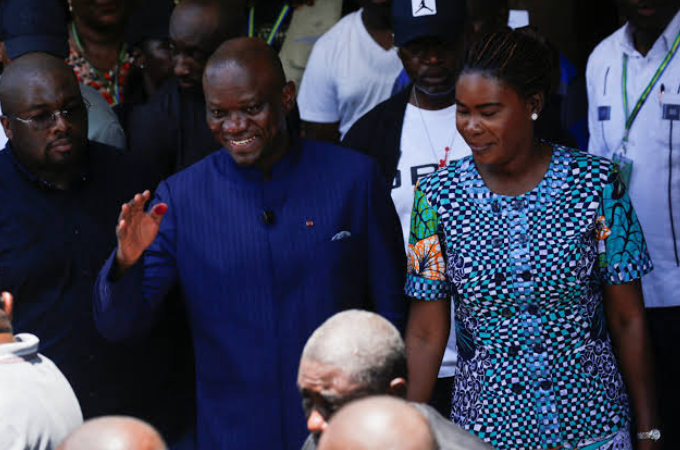Libreville – Gabonese voters voted on Saturday in a presidential election widely expected to make junta chief Brice Oligui Nguema the oil-rich central African country’s first elected leader since his 2023 coup.
Oligui led the August 30, 2023, putsch that ended 55 years of dynastic rule by the Bongo family, who were accused of looting Gabon’s wealth.
“I am very confident. May the best man win,” said Oligui, who has been leading in opinion polls, as he cast his ballot alongside first lady Zita at a school in the centre of the capital Libreville before a media scrum of clicking cameras.
Gabon’s Junta leader Brice Oligui Nguema who led a 2023 military coup clinches presidency with a staggering 90% in the first post-coup election.
His closest rival trails at just 3%. Turnout: 70.4%.
The Bongo dynasty is gone but has real democracy arrived? pic.twitter.com/WyzkuXstk1— Bakinyumya Douglas Paapa Ov Uganda (@BDouglasPaapa) April 14, 2025
Snaking queues were seen outside polling stations in the seaside city as voting got under way in bright sunshine after a stormy night.
After voting ended at 6:00 pm (1700 GMT), the interior ministry said turnout had run to 87.12 percent.
Aurele Ossantanga Mouila, 30, voted for the first time ever after finishing his shift as a croupier in a casino.
“I did not have confidence in the earlier regime,” he said.
Pensioner Eugenie Tchitembo Onanga, 68, said of Oligui: “Everyone will vote for him, I assure you. It’s God’s choice.”
Oligui confident
Oligui took the role of transitional president while overseeing the formation of a government that includes civilians, tasked with drawing up a new constitution.
The country of 2.3 million people is casting ballots at a time of high unemployment, regular power and water shortages, a lack of infrastructure and heavy government debt.
Despite successive plans, only 2,000 of the 10,000 kilometres (6,213 miles) of roads in the country are usable, according to official data. Derailments are frequent on the sole rail link and youth unemployment exceeds 60 percent in rural areas.
Oligui ditched his military uniform as he campaigned for a seven-year term against seven rival candidates, including Alain-Claude Bilie By Nze, who served as prime minister under Ali Bongo before the coup.
Around 920,000 voters were eligible to cast ballots, with final results expected on Monday.
Oligui has predicted a “historic victory”.
“The builder is here, the special candidate, the one you called,” Oligui said Thursday, among the music and dancing at his closing rally in the capital Libreville.
But critics accuse Oligui, who had promised to hand power back to civilians, of failing to move on from the years of plunder of the country’s vast mineral wealth under the Bongos, whom he served for years.
Oligui’s image has been plastered all over the capital Libreville during his campaign, while those of his rivals are nowhere to be seen.
Election monitors complain
Bilie By Nze, his main opponent, has cast himself as the candidate for a “complete break” with the past.
He has accused Oligui, who led the Republican Guard in the Bongo years, of representing the old system.
After voting Saturday, he told reporters he was “serene”, while adding that even if voting passed off smoothly, “it’s in the evening during the counting that there are problems.
Huko Gabon 🇬🇦 sahii ni vibes ajab.
This is the newly elected President of Gabon, General Brice Clotaire Oligui Nguema. He won with 90.35% of the total votes casted. pic.twitter.com/I7sRHG2x1S
— M O I B E N S H I R E (@Kapyoseiin) April 14, 2025
“We’ll see what it will bring,” he added, raising the possibility of potential electoral fraud.
Election monitors the Citizens Observers Network (ROC) said they had been denied access to voting bureaus in several places.
Oligui insisted however that the voting process had been “transparent” and “peaceful”.
Debt challenge
Oligui served as patriarch Omar Bongo’s former aide-de-camp before becoming chief of the presidential guard under his son Ali Bongo.
Whoever wins will have to meet the high hopes of a country where one in three people lives below the poverty line despite its vast resource wealth, according to the World Bank.
Gabon’s debt rose to more than 73 percent of GDP last year and is projected to reach 80 percent this year.
Analyst Neyer Kenga likewise pointed to “the return to constitutional order” as one of the key campaign issues, in the hope the vote puts an end to the country’s strife.
In recent weeks, the interior ministry has been at pains to insist Saturday’s vote will be “a transparent ballot and an election accessible” to all.
“Today all Gabonese are firmly in favour of a democratic game that is played within the rules,” said Neyer Kenga.
Following years marked by a post-vote crisis in 2009 and 2016’s bloodily repressed protests – not to mention the August 2023 coup – “the people’s response at the ballot box is never known in advance”, she added.
Follow African Insider on Facebook, Twitter and Instagram
Picture: X/@BDouglasPaapa
For more African news, visit Africaninsider.com
Source: AFP


